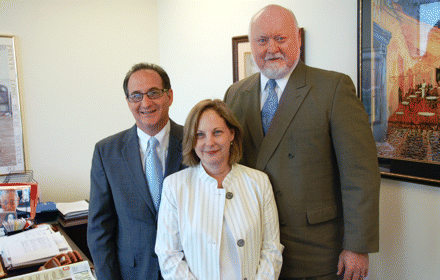The American Psychiatric Foundation (APF) will use a $1.3 million grant from the Bristol-Myers Squibb Foundation to help develop a program for mentally ill people in the criminal-justice system in Miami/Dade County, Fla.
The program will operate in the nation's first forensic diversion facility, now under construction and scheduled for completion by the end of 2012.
The site will be part jail, part short-term residence program, and part crisis-stabilization center.
"This will build a national model for courtrooms and communities," said Paul Burke, executive director of the APF.
Implementing the program should help get individuals with serious mental illnesses in the criminal-justice system into recovery, increase public safety, and save tax dollars, said Burke.
The combination of deinstitutionalization and a failure to develop adequate community-based services has led to increased incarceration of people with mental illnesses, said Steven Leifman, J.D., a Miami judge and a member of the APF board.
"This is an outrageous and an offensive situation," Leifman told Psychiatric News.
The grant will support a coordinated system of care that will, for the first time in the United States, systematically incorporate all the elements identified by a task force of the Substance Abuse and Mental Health Services Administration in 2009 as essential to reversing the criminalization of people with mental illness.
Plans for the Miami/Dade program were developed jointly by Leifman, Burke, APF's director of corporate and community relations Linda Bueno, and psychiatrist Fred Osher, M.D., director of health systems and services policy at the Council of State Governments Justice Center.
The program's elements include
Intensive case management,
Treatment that reflects the effects of trauma in the lives of prisoners,
Supportive housing and education services,
Integrated treatment for dually diagnosed patients,
Assertive community treatment, and
Cognitive-behavioral interventions that target risk factors such as living in a high-crime area.
This integrated approach is designed to provide a "soft landing" back into the community, said Leifman.
The program will begin by focusing on individuals who appear disproportionately in the county's criminal-justice system, he said.
One study found that over a five-year period, 97 people in Miami/Dade County were arrested more than 200 times each and spent 22,000 days in jail at a cost of $13 million to the taxpayers.
Targeting those high-use individuals could make a major difference in reducing costs and recidivism, Leifman noted.
"This has never been tried before," he said. "The APF will help educate the community and policymakers, using validated data to show how much can be saved. We will be at the forefront of changing how defendants with mental illness are treated."
The planned Miami/Dade program draws on the experience gained during a successful APF-supported pilot program, designed with the help of five psychiatrists and held in Springfield, Ill., in May, said Leifman.
Many Illlinois judges had typically responded abrasively to disruptive courtroom behavior by defendants with mental illnesses, he said.
To overcome that pattern, the Illinois pilot program educated judges from every circuit in the state to identify mental illness in people who appear in court and to refer them for help. Testing before and after the program showed that the judges must have been paying attention: "Scores went through the roof," said Leifman.
The grant from the Bristol-Myers Squibb Foundation includes a $250,000 research component to evaluate the new program and eventually disseminate the model nationwide. "We want to inform psychiatrists and judges in every state about the program," Burke said.

